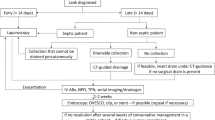Abstract
Background
Leaks occur in 1.4–20 % (Bohdjalian et al., Obes. Surg. 20:535–540, 2010; Nocca et al., Obes Surg. 18:560–565, 2008; Stroh et al., 19:632–640, 2009; Aurora et al., Surg. Endosc. 26:1509–1515, 2012) of patients following laparoscopic sleeve gastrectomy (LSG). Leaks may lead to major morbidity and prolonged hospitalization. Endoscopic stent placement is a potential management strategy that needs expertise and also has recognized complications (stent migration, significant dysphagia, and failure) (Rosenthal et al., Surg. Obes Relat. Dis. 8:8–19, 2012). A standard method of managing leaks following LSG has not been established. This study aims to evaluate the outcomes of consecutive patients with leaks following LSG managed at BMI Abu Dhabi Tertiary Multidisciplinary Bariatric Surgery, Abu Dhabi, UAE.
Methods
We examined all patients presenting to BMI Abu Dhabi between February 2010 and May 2012 with leaks following LSG. Data were obtained from the hospital medical record, and IRB approval was obtained. All patients were managed by utilizing a standardized operative management strategy without the use of endoscopic stenting.
Results
A total of five patients were referred to us for higher level of care; during the same time period, we performed 71 LSGs without a leak. Patients were optimized and resuscitated adequately before surgery. Intraoperatively, all patients had endoscopy, and a T tube was placed inside the leak if clearly identifiable. Otherwise, the leak site was drained adequately without attempting to place sutures, and a jejunostomy tube was inserted. All leaks healed following an initial period of hospital stay, followed by an outpatient period on jejunostomy tube feeding and nil per os.
Conclusion
Single-stage operative management of leaks after LSG utilizing a standardized operative strategy without the use of endoscopic stenting is both safe and effective.

Similar content being viewed by others
References
Menenakos E, Stamou KM, Albanopoulos K et al. Laparoscopic sleeve gastrectomy performed with intent to treat morbid obesity: a prospective single-center study of 261 patients with a median follow-up of 1 year. Obes Surg. 2010;20(3):276–82.
Bohdjalian A, Langer FB, Shakeri-Leidenmuhler S et al. Sleeve gastrectomy as sole and definitive bariatric procedure: 5-year results for weight loss and ghrelin. Obes Surg. 2010;20:535–40.
Nocca D, Krawczykowsky D, Bomans B et al. A prospective multi-center study of 163 sleeve gastrectomies: results at 1 and 2 years. Obes Surg. 2008;18(5):560–5.
Stroh C, Birk D, Flade-Kuthe R et al. Bariatric Surgery Working Group. Results of sleeve gastrectomy-data from a nationwide survey on bariatric surgery in Germany. Obes Surg. 2009;19(5):632–40.
Aurora AR, Khaitan L, Saber AA et al. Sleeve gastrectomy and the risk of leak: a systematic analysis of 4,888 patients. Surg Endosc. 2012;26(6):1509–15.
Rosenthal RJ, Diaz AA, Arvidsson D et al. International Sleeve Gastrectomy Expert Panel Consensus Statement: best practice guidelines based on experience of >12,000 cases. Surg Obes Relat Dis. 2012;8(1):8–19.
Sánchez-Santos R, Masdevall C, Baltasar A et al. A Short- and mid-term outcomes of sleeve gastrectomy for morbid obesity: the experience of the Spanish National Registry. Obes Surg. 2009;19(9):1203–10.
Hutter MM, Schirmer BD, Joes DB et al. First report from the American College of Surgeons Bariatric Surgery Center Network: laparoscopic sleeve gastrectomy has morbidity and effectiveness positioned between the band and the bypass Ann Surg 2011;254:410–422
Dapri G, Cadiere GB, Himpens J et al. Reinforcing the staple line during laparoscopic sleeve gastrectomy: prospective randomized clinical study comparing three different techniques. Obes Surg. 2010;20:462–7.
Cottam D, Qureshi FG, Mattar SG et al. Laparoscopic sleeve gastrectomy as an initial weight-loss procedure for high-risk patients with morbid obesity. Surg Endosc. 2006;20:859–63.
Csendes A, Braghetto, Leon P et al. Management of leaks after laparoscopic sleeve gastrectomy in patients with obesity. J Gastrointest Surg. 2010;14(9):1343–8.
Kelegregorius M, Sotiropoulou E, Stathopoulos K et al. CT-guided percutaneous drainage of infected collections due to gastric leak after sleeve gastrectomy for morbid obesity: initial experience. Cardiovasc Intervent Radiol. 2011;34(3):585–9.
Casella G, Soricelli E, Rizzeloo M, et al Nonsurgical treatment of staple line leaks after laparoscopic sleeve gastrectomy. Obes Surg. 2009;19:821–6.
Welsch T, Von Frankenberg M, Schmidt J et al. Diagnosis and definition of anastomotic leakage from the surgeon's perspective. Chirurg. 2011;82(1):48–55.
de Aretxabala D, Leon J, Wiedmaier G et al. Gastric leak after sleeve gastrectomy: analysis of its management. Obes Surg. 2011;21(8):1232–7.
Eubanks S, Edwards CA, Fearing NM et al. Use of endoscopic stents to treat anastomotic complications after bariatric surgery. J Am Coll Surg. 2008;206(5):935–8. discussion 938–9.
Lacy A, Ibarzabal A, Pando E et al. Revisional surgery after sleeve gastrectomy. Surg Laparosc Endosc Percutan Tech. 2010;20(5):351–6.
Abraham A, Rizvon K, Singh J et al. Successful management of a gastric sleeve leak with an endoscopic stent. Case Rep Gastrointest Med. 2012;2012:205979. Epub 2012 May
Nguyen NT, Njuyen XM, Dholakia C. The use of endoscopic stent in management of leaks after sleeve gastrectomy. Obes Surg. 2010;20(9):1289–92.
Lalor PF, Tucker ON, Szomstein S et al Complications after laparoscopic sleeve gastrectomy. Surg Obes Relat Dis. 2008;4:33–8.
Albanopoulos K, Alevizos L, Linardoutsos D et al. Routine abdominal drains after laparoscopic sleeve gastrectomy: a retrospective review of 353 patients. Obes Surg. 2011;21(6):687–91.
Conflict of Interest
The authors of this study (Abdelrahman Nimeri, MD; Mohammed Al Hadad, MD; and Maria Margarita, RN) as well as the training doctors (Awadelkarim Mohamed, MD; Eelaf El Hassan, MD; and Maha Ibrahim) all have no conflicts of interest to report.
Author information
Authors and Affiliations
Corresponding author
Rights and permissions
About this article
Cite this article
El Hassan, E., Mohamed, A., Ibrahim, M. et al. Single-Stage Operative Management of Laparoscopic Sleeve Gastrectomy Leaks Without Endoscopic Stent Placement. OBES SURG 23, 722–726 (2013). https://doi.org/10.1007/s11695-013-0906-2
Published:
Issue Date:
DOI: https://doi.org/10.1007/s11695-013-0906-2




